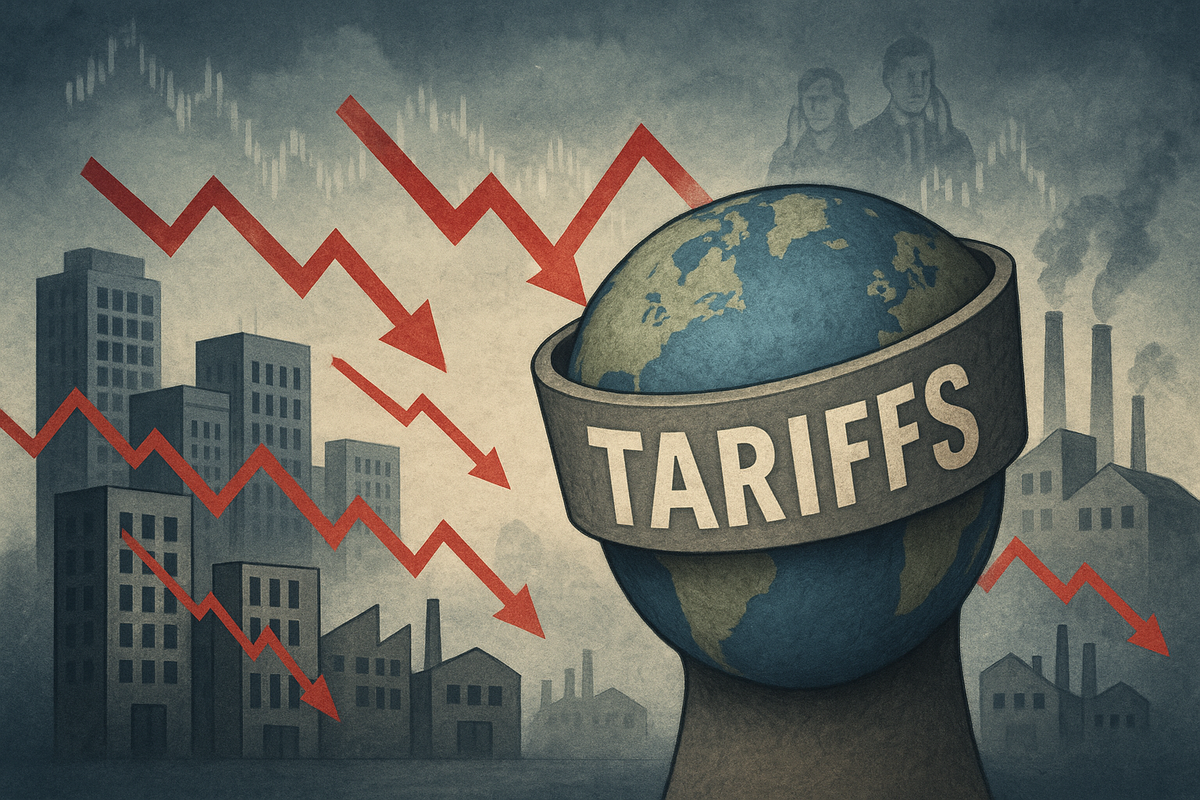
The global financial landscape is increasingly feeling the squeeze of escalating trade tensions, with corporate earnings and broader market sentiment bearing the brunt of protectionist policies. US President Donald Trump's executive orders, imposing hefty tariffs on a range of imported goods, are sending ripple effects through supply chains, forcing companies to re-evaluate strategies, and casting a shadow of uncertainty over investor confidence. This aggressive stance on trade is not merely a political maneuver; it's a tangible economic force reshaping the profitability of multinational corporations and influencing the daily decisions of consumers and businesses alike.
The Tariff Tempest: How Protectionism is Reshaping Global Commerce
The current economic climate is heavily influenced by the strategic deployment of tariffs by the US administration, primarily under former President Donald Trump. These duties, levied on imported goods, are designed to protect domestic industries and encourage local production, but their immediate impact has been a significant increase in costs for businesses reliant on global supply chains. The rationale behind these tariffs, often cited as national security or unfair trade practices by other nations, has led to a tit-for-tat escalation, with retaliatory tariffs from countries like China and the European Union. This trade war has directly translated into higher input costs for manufacturers, reduced profit margins for retailers, and a general sense of unease in the market.
The timeline of these events began in early 2018 when the Trump administration first imposed tariffs on steel and aluminum imports, citing national security concerns. This was quickly followed by tariffs on a wide range of Chinese goods under Section 301 of the Trade Act of 1974, alleging intellectual property theft and unfair trade practices. Key players involved include the US Trade Representative's office, the Department of Commerce, and various industry lobbying groups. Initial market reactions were volatile, with stock market indices experiencing dips as investors grappled with the potential for reduced global trade and corporate profitability.
Navigating the Storm: Winners and Losers in the Tariff Tug-of-War
The imposition of tariffs has created a distinct divide in the corporate world, producing clear winners and losers. Companies heavily reliant on global supply chains, particularly those sourcing components or finished goods from countries targeted by tariffs, have seen their costs surge. This directly impacts their bottom line, often leading to reduced profit margins or, in some cases, price increases for consumers. Conversely, domestic producers of goods now subject to tariffs may experience a competitive advantage, as their imported rivals face higher costs.
One prominent example of a company directly impacted is Caterpillar (NYSE: CAT). The heavy equipment manufacturer has repeatedly cited tariffs as a significant headwind, impacting its material costs and, consequently, its earnings. In past earnings calls, the company has detailed how steel and aluminum tariffs, as well as broader trade tensions, have led to increased expenses and uncertainty in its global operations. Similarly, Yum! Brands (NYSE: YUM), the parent company of KFC, Pizza Hut, and Taco Bell, has faced challenges related to tariffs affecting its supply chain, particularly for ingredients and equipment sourced internationally. While not always directly attributing missed targets solely to tariffs, the broader trade environment has contributed to a more challenging operating landscape for such global enterprises.
On the other side of the coin, some domestic industries, particularly those in steel, aluminum, and certain agricultural sectors, have seen a temporary boost due to reduced foreign competition. However, even these "winners" often face secondary impacts, such as retaliatory tariffs on their exports, which can negate any initial gains. For instance, US agricultural exports, particularly soybeans, have been heavily targeted by retaliatory tariffs from China, hurting American farmers. The overall sentiment among investors has been one of caution, as the unpredictable nature of trade policy makes long-term planning difficult for many multinational corporations.
Ripple Effects: Industry-Wide Shifts and Broader Economic Implications
The tariff saga extends far beyond individual corporate balance sheets, triggering significant industry-wide shifts and broader economic implications. The most immediate and pervasive effect has been the disruption of established global supply chains. Companies that have spent decades optimizing their production and sourcing networks are now forced to re-evaluate, seeking alternative suppliers in non-tariffed countries or considering reshoring production. This re-engineering is costly, time-consuming, and often leads to inefficiencies in the short term, impacting industries from automotive to electronics.
Beyond supply chains, consumer spending is also under pressure. As companies absorb higher tariff costs, they often pass some of these expenses onto consumers through increased prices. This inflationary pressure can erode purchasing power, potentially leading to a slowdown in retail sales and broader economic growth. Investor confidence has also taken a hit, as the unpredictability of trade policy creates an environment of uncertainty. This can lead to reduced foreign direct investment, delayed capital expenditures, and a general reluctance to commit to long-term projects, all of which can stifle economic expansion.
Historically, trade wars have often led to negative economic outcomes, as seen during the Great Depression with the Smoot-Hawley Tariff Act. While the current situation is not as severe, the parallels serve as a cautionary tale. Regulatory and policy implications are also significant, as governments worldwide grapple with how to respond to protectionist measures while protecting their own industries. This often involves complex negotiations, retaliatory measures, and a re-evaluation of international trade agreements, further complicating the global economic landscape.
The Road Ahead: Navigating Uncertainty and Adapting to New Realities
Looking ahead, the trajectory of tariffs and their impact remains a critical unknown for businesses and investors. In the short term, companies will likely continue to focus on mitigating the immediate effects of existing tariffs, which includes diversifying supply chains, negotiating with suppliers, and potentially adjusting pricing strategies. For some, this might involve absorbing higher costs to maintain market share, while others may pass costs onto consumers, risking demand elasticity. The ongoing political landscape, particularly the outcome of future elections in key economies, will heavily influence the potential for further tariff implementations or, conversely, a de-escalation of trade tensions.
In the long term, the current trade environment could catalyze significant strategic pivots. Companies may accelerate efforts to regionalize their supply chains, bringing production closer to end markets to reduce exposure to cross-border tariffs. This could lead to increased investment in domestic manufacturing capabilities in various countries. Furthermore, there may be a greater emphasis on automation and technological advancements to offset higher labor costs associated with reshoring. Market opportunities could emerge for logistics companies specializing in supply chain re-optimization, as well as for domestic producers who can scale up to meet demand previously fulfilled by imports. However, challenges will persist for companies with deeply entrenched global operations that are difficult to untangle. Potential scenarios range from a full-blown trade war leading to a global recession to a negotiated settlement that gradually unwinds tariffs, restoring some semblance of predictability to international trade.
Conclusion: A New Era of Trade Volatility and Strategic Adaptation
The ongoing impact of tariffs on corporate earnings and market sentiment marks a significant shift in the global economic paradigm. What began as targeted protectionist measures has evolved into a complex web of trade tensions, forcing businesses to confront unprecedented levels of uncertainty and adapt their long-standing operational models. The immediate takeaway is clear: companies with diversified supply chains and robust risk management strategies are better positioned to weather the storm, while those heavily reliant on single-source international suppliers face considerable headwinds.
Moving forward, investors should closely monitor not only corporate earnings reports for direct mentions of tariff impacts but also broader economic indicators such as manufacturing output, consumer confidence, and global trade volumes. The market will continue to react to every development in trade negotiations, and any signs of de-escalation or further escalation will likely trigger significant movements. The lasting impact of this period of trade volatility may be a more fragmented global economy, with companies prioritizing resilience and regionalization over pure cost efficiency. This new era demands strategic agility, a deep understanding of geopolitical risks, and a willingness to innovate in the face of evolving trade landscapes. The coming months will be crucial in determining whether the current tariff pressures become a temporary disruption or a catalyst for a fundamental restructuring of global commerce.




